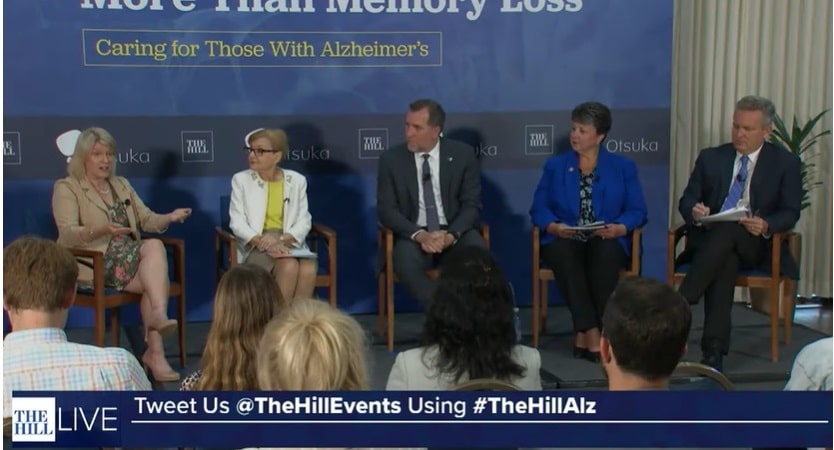
Sue Peschin, MHS, president and CEO
November is National Alzheimer’s Disease Awareness Month and it is time to show support for the more than 6 million Americans living with the disease and their family caregivers. Until recently, no treatments have been available to potentially delay progression of the disease.
So, I was floored to receive an email earlier this month from the Centers for Medicare & Medicaid Services (CMS) with a fact sheet asserting that increases in the 2022 Medicare Part B premium and deductible were due to the possibility of coverage for a “high cost Alzheimer’s drug.” Soon after, the U.S. House Energy and Commerce Committee piled on with a press release, noting that, “Today’s announcement from CMS confirms the need for Congress to finally give Medicare the ability to negotiate lower prescription drug costs.”
This duo of political tactics was, quite simply, inappropriate. For as long as I have been an advocate for older adults, I do not recall CMS publicly calling out the cost of care for a specific disease or chronic condition as the rationale for raising premiums. Imagine if CMS called out treatments for cancer, organ transplant, or vision loss to blame for premium increases.
Unfortunately, sometimes bad things do come in threes. The third blow this month for people living with Alzheimer’s disease was the direct negotiation language within the Build Back Better Act (H.R. 5376). In its current state, the language would allow use of value assessments that have been shown to discriminate against older adults and people with disabilities.
The National Council on Disability (NCD) and more than 130 advocacy organizations have implored policymakers to reject drug pricing policies that rely on the Quality-Adjusted Life Year (QALY) or similar metrics, either directly or indirectly by referencing foreign prices for medicines. The reason is that QALY assessments usually undervalue treatments for groups of people who have less “life years” or “perfect health” ahead of them (e.g., people with disabilities and people with chronic illnesses such as Alzheimer’s disease). Such analyses have been used for decades in many European countries, resulting in access issues and higher mortality rates for chronic diseases like cancer.
QALYs also seek to generalize the population, which sounds like it would have an equalizing effect, but populations that experience social disadvantage are routinely considered more expensive to treat. A recent paper by Charles River Associates examined the impact of QALYs on Black and Latinx persons with Alzheimer’s disease in Australia, Canada, and the UK. The report found that “the true value of new medicine to specific groups in society is not captured through QALY-based value assessment, which reinforces health inequities in coverage and access decisions.” This finding is especially prescient, considering that CMS prioritized equity in its national coverage analysis of monoclonal antibodies directed against amyloid to treat Alzheimer’s disease.
The Build Back Better Act’s leading proponents claim to protect against QALY-type discrimination by including the following language: “the [HHS] Secretary shall not use evidence or findings from comparative clinical effectiveness research in a manner that treats extending the life of an elderly, disabled, or terminally ill individual as of lower value than extending the life of an individual who is younger, nondisabled, or not terminally ill.” However, without an overt ban on use of the QALY or similar average metrics, this language can easily be misinterpreted. Any claims that this language will prevent discrimination are disingenuous and incorrect.
Earlier this month, the Chair of the NCD, sent a letter to Congress to “strongly encourage the inclusion of an unambiguous ban on the QALY within the text of the Build Back Better Act…I further encourage you to utilize the reconciliation package as an opportunity to expressly prohibit the use of the QALY by Medicaid and Medicare.” In a new survey from the Partnership to Improve Patient Care, 81 percent of respondents agreed that current safeguards protecting against misuse of comparative and cost-effectiveness assessments should be strengthened by Congress.
People living with Alzheimer’s disease should not be scapegoats for this Administration’s choice to excessively increase premiums, or for its joint effort with Congress to peddle price setting for prescription drugs. Regardless of opinions on the efficacy of the new treatment or its price, this was a shameful and ageist thing to do to a community that already faces a high degree of isolation and stigma.
Let’s hope the U.S. Senate chooses to do better.






